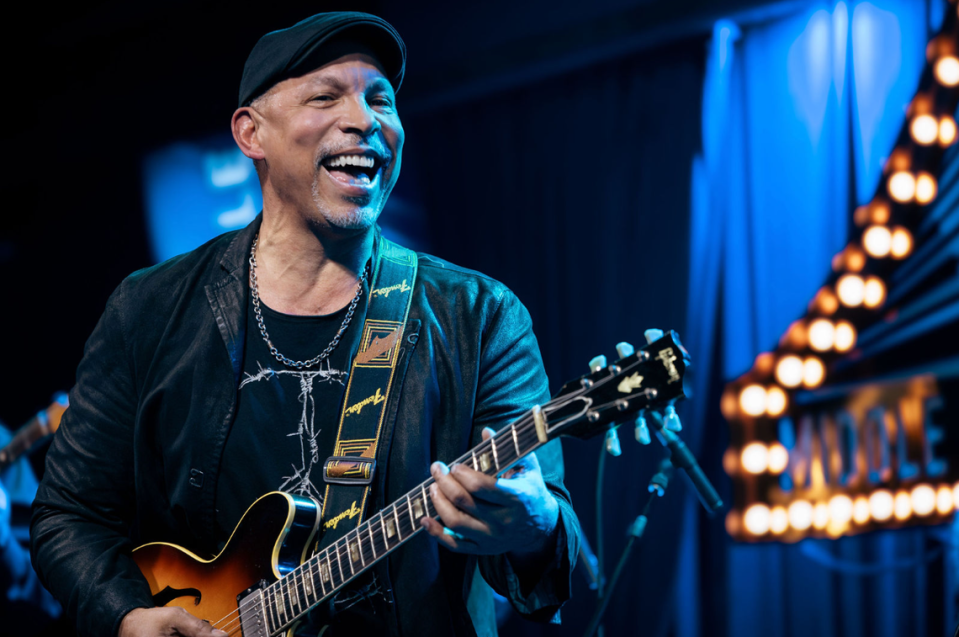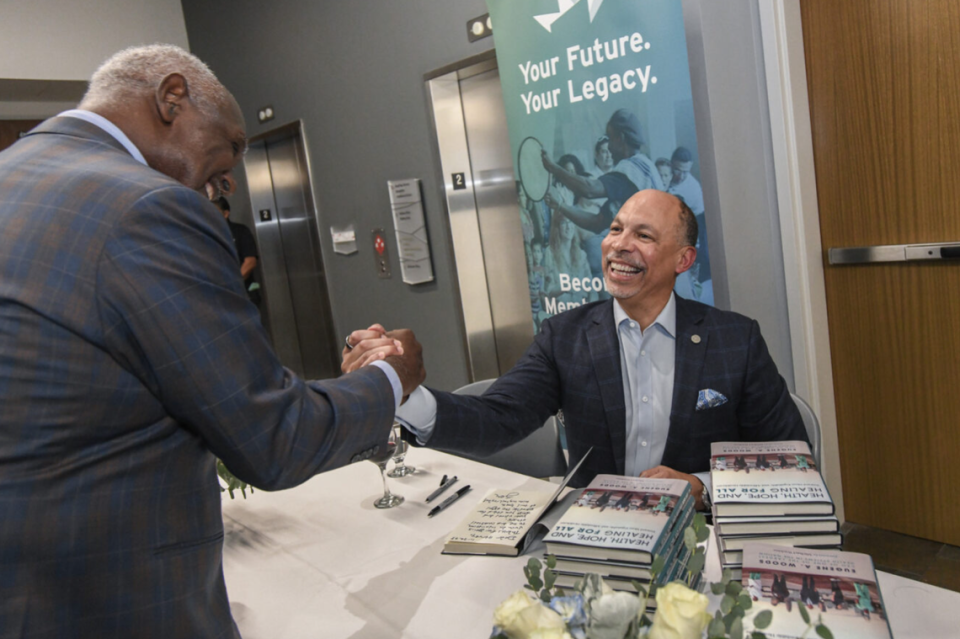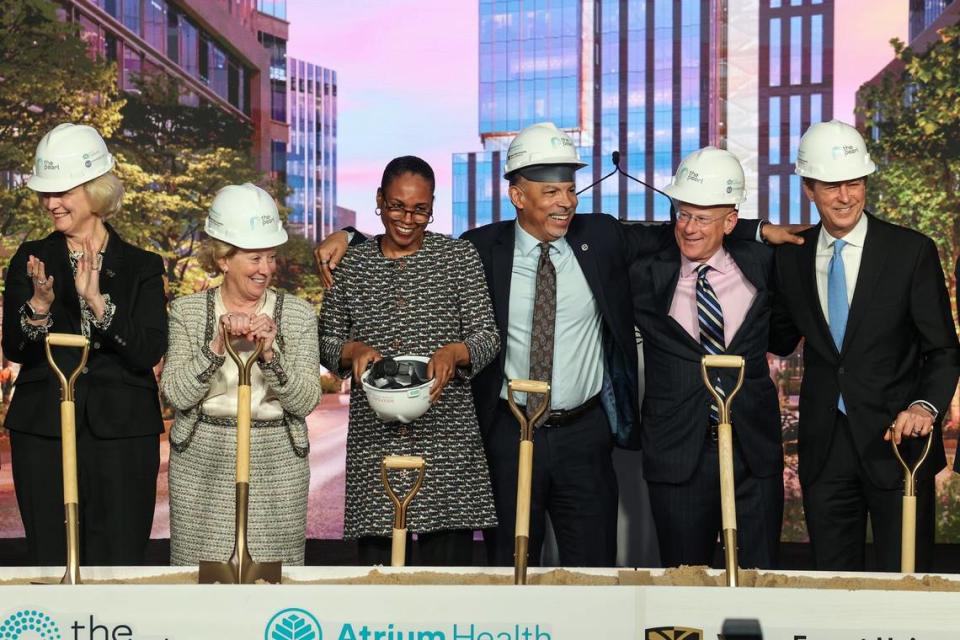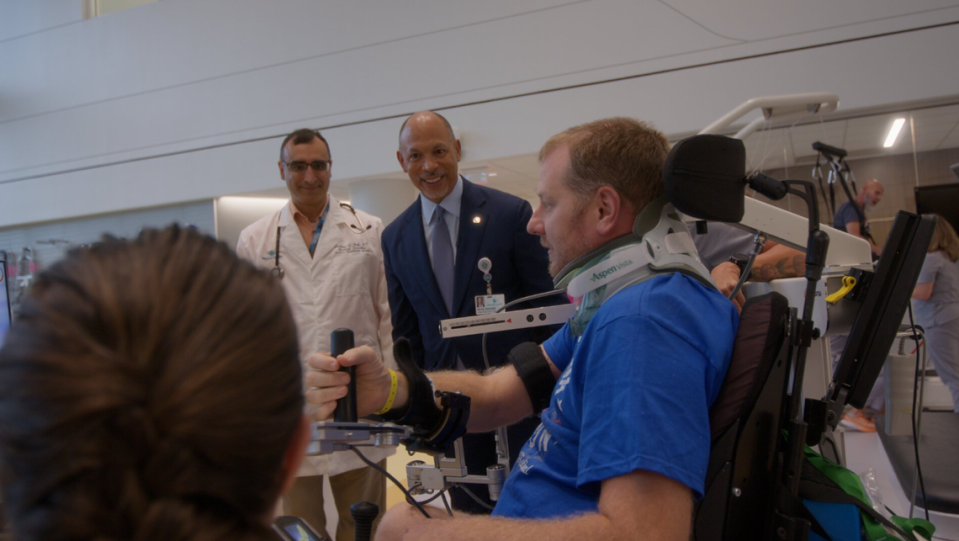Atrium and Advocate Health CEO on his music, his bride-to-be, and turning 60 years old
If you were to start poking around the website for Summerfest — the annual Milwaukee, Wisconsin extravaganza billed as the “world’s largest music festival” — you might stumble upon a page that vaguely suggests Gene Woods will be one of the acts in the lineup for 2024.
The Charlotte singer and bandleader did somewhat famously perform with his jazz outfit The Soul Alliance on one of Summerfest’s stages last June. But a return for an encore?
“That would be a surprise to me, because —” he starts to say, before interrupting himself to ask, “It shows that I’m going to be there?”
It does, a visitor to his office says. Sort of. So he clarifies. “No, where I’m playing this year is I’m getting married. I’m playing at my wedding,” Woods says, laughing. “That’s the main gig this year.”
And if tying the knot with his fiancee Lauren Wooden and playing music for his family and friends to celebrate doing so wasn’t enough to keep him preoccupied in June already, there’s this: That same month, Woods is set to become the sole CEO of Advocate Health, the third-largest nonprofit health system in the country. (Charlotte-based Advocate Health is the parent company of Atrium Health, where Woods previously served as president and CEO since 2016.)
Oh, and then in July, he’ll turn 60 years old.
The Charlotte Observer extensively profiled Woods during the height of the pandemic in October 2020, when he referred to his musical hobby as “just sort of my mental health therapy.” Since then, he’s released an album, performed at Summerfest, been featured as a musically inclined CEO on the “Today” show, and just this past November put out a book — not about music, but healthcare.
He’s one of Charlotte’s most powerful CEOs. He also sings, and wears sunglasses at night.
Earlier this month, the Observer stopped by his office to catch up with him on all of this, as over his shoulder and off in the distance work busily continued in uptown on construction of Atrium’s new medical school building and its even larger research building.
There was a heavy focus on music, but a healthy dose of talk about the future of healthcare and his vision for it, too.
The conversation has been edited for clarity and brevity.
Q. Your debut album, “Love & Protest,” came out in May 2022. What kind of reaction have you gotten to it?
People from around the country are calling me — that I hadn’t talked to in a long time — when they saw my music on Spotify. It’s exciting from that perspective.
I get a lot of feedback from the teammates (Atrium’s term for employees). For example, recently I was in the Midwest, and we had this meeting with about 20 clinicians about their quality initiatives and how they’re progressing. At the end of the meeting, one doctor says, “When are you going to drop your next album?” So it’s great to have the connection with teammates on a whole different level. It’s allowed me to connect internally and externally in ways I really hadn’t anticipated.
The musicians that I’ve played with — national artists (including Adrian Crutchfield, a saxophonist who played with Prince and New Power Generation; Aaron Sterling, a drummer who has toured with John Mayer; George “Spike” Nealy, who was James Brown’s percussionist) — are giving good feedback.
There are also a lot of folks that have listened to it and want me to do tours and things of that nature. I get requests almost on a weekly basis for weddings, bar mitzvahs, fundraisers — which I’m flattered by. But I’ve got a pretty busy day gig. In terms of playing live, I probably have time to do it maybe twice, maybe three times a year.
But for me, it’s just all about connection, and having a hobby that I can sort of use to disconnect from work.

Q. How did your gig at Summerfest last year come about?
As we were coming together with Advocate Health, in June 2022, I wanted to get a sense for the Milwaukee community (where Aurora Health Care, which like Atrium is now part of Advocate, is based). We were in the final stages of the Federal Trade Commission review. So I go to Summerfest for the first time, and I was rounding all the stages with this guy that’d been there for 40 years. He had booked Tom Petty 14 times. He was telling stories about that. About Prince. The Stones.
And somehow, the president of the festival found out that I had released an album the month before, and he asked me, “Can I get a copy?” So I sent him a copy. Soon after that, I get a call: “Can you play at next year’s festival?” I said, “We are in the middle of this big combination, and I don’t know if I’m going to have the time.” But we kept talking about it, and it turned out that our board meeting — our leadership meeting — was this past June in Milwaukee. We were taking the board to all the communities that we serve, and we were actually going to be in Milwaukee at that time.
So I had a chance to bring my band there. Thursday and Friday, I’m having full-day leadership meetings. Saturday, I’m playing at the festival. Then Monday through Wednesday, I have three days of board meetings. Talk about work-life harmony!
Then the “Today” show saw that I played there, and that’s when they wanted to come visit us.
Q. Did you have to think about the “Today” show, and whether or not it was a good idea to allow that part of your personal life to be featured?
I did. The conversation I had is: “If this is just a piece on me playing music, I don’t know that I’m interested. If this is an opportunity for me to help share why music is important as a healing art and things of that nature, then I would be interested.” And the thing I really appreciated about Anne Thompson and the “Today” show is they then rounded at our clinical sites — at our rehab, one of the top rehab centers in the entire nation. They engaged with our patients. They showed that part of who we are. I think they provided the right balance, if you will.
Q. Can you talk a little bit more about the concept of using music as a source of healing?
There are a lot of evidence-based studies coming out in terms of the actual effect of music and healing. We have a lot of researchers here studying that. We’re really doing groundbreaking work in what’s called acoustic neuromodulation technology. Basically, the brain gives off its own sound and its own frequency, and we’re studying how when the brain hears itself, it resets its stress response and calms anxiety.
We’re using music therapy for gait — for how people walk when they have dementia. It’s amazing: When a therapist tries to get a patient to walk, sometimes if they put on their favorite song, they start walking to the beat and the cadence of the music.
We have music therapists at our children’s hospital, so when a child is dealing with a significant clinical issue, a music therapist comes and helps sing their favorite song. There’s evidence that shows that that decreases anxiety, and also pain.
Q. OK, so after that “Today” show segment aired, I heard that “America’s Got Talent” reached out about the idea of having you as a contestant on the show.
Yeah. And I respect that show. I really like what it stands for in terms of finding talent. But it’s not something I would think I would personally participate in, because I don’t want people to confuse that that’s my main focus. It’s a hobby on the side.
Between the combination with Advocate Health, building a medical school, building an innovation district, really driving all of the initiatives that we are, that’s obviously the main focus.
Q. How much time a week, roughly, would you say you are able to dedicate to music?
That’s an interesting question. When you’re playing music, you always wish you had more time to practice. When I was coming up (as a young man), it wasn’t unusual for me to put three hours of practice in a day. Obviously, I don’t have time to do that now.
So it’s highly variable. If I’m going to the studio to record a song, or playing a gig, that’s the incentive I have for practicing. But I would say these days maybe a few hours every week is where I get a time to grab the guitar, or work on some music.
I’m picking up a guitar every day. It’s a way of grounding me for the work that I do.
Q. Did you meet your fiancee through music?
We didn’t meet through music. We met through mutual friends. But our first date, we worked on a song together. Our second date, we were in the studio recording a song. And our third date, we recorded a music video. So music was very much part of our connection from the very beginning.
Her family is full of musicians. Her brother plays in New York — sings in New York every single week. Her sister, when she was 18 or 19, was signed to the same label as Amy Winehouse was signed to. Her great uncle was Billy Kyle, who was a piano player for Louis Armstrong.
Then my son is a musician. So now we’re bringing two families together that love music.
Actually, the Thanksgiving before last, when our families first came together as a whole, we put on a 2-1⁄2-hour concert just ourselves. It was the most incredible way of getting to know each other and having fun.
And at the wedding, my band’s going to be there, and she’s a singer, and plays the guitar, piano, and flute. So we’ll do some songs together.
Q. Meanwhile, you also published your book, “Health, Hope, and Healing for All,” in November. What was the impetus behind that project?
I started it just before the pandemic hit, and was trying to tell the story of who we were. The pandemic changed everything. The focus became that I really wanted to make sure I captured the essence of what happened behind the scenes, how we helped to shepherd one of the largest health systems in the nation through a pandemic. The incredible stories that came out of that, the decisions we had to make on a moment’s notice, and the heroic effort of our teammates on the front line.
I wanted in the book to make sure we captured the lessons we learned and didn’t forget them, then built them into who we were becoming.

Q. So it was never going to be a memoir?
No, it was never going to be a memoir. But someday, when I retire, I’d like to do a reflection on my career.
Q. And once you retire I assume you’ll also want to make more time for music?
Yes. When I retire, I have this vision of doing a European tour. That’s going to be my first year after I retire — hit Paris, and hit Barcelona, and other places like that.
Q. Do you have a target date or age for retirement?
I don’t. There is certainly enough underway to keep me busy for the next decade, and I’m really enjoying it. There are still so many opportunities we have to make healthcare better.
So I see myself doing this, God willing, for quite some time.
Q. In regards to these opportunities you see ahead for improvements in care — as you know, people are always complaining about healthcare costs. What do you foresee happening with those within the system as you move forward?
I would say three things:
In our first year together, we reduced costs by $229 million. I don’t think there are many systems that come together and have that kind of savings in the first year. And that comes from a whole bunch of things, including purchasing supplies. We had a number of vendors for gloves, for example; we consolidated that and saved $7 million. We believe, over the next couple of years, that number will grow in terms of savings to about a billion dollars.
Then last year, we changed our charity care policy (to provide full financial assistance for those whose income is 300% of the federal poverty level). With the change in policy, for example, take a single mother with a child. Federal poverty guidelines say the minimum is $20,000. Our policy is 300% of that. So let’s say this same mother makes $60,000 and brings in her child for care. We don’t even bill her. That’s about 500 patients every day.
Finally, there’s something Medicare calls Accountable Care Organizations, which measure us on our costs and our quality. And I know when systems get bigger, people talk about cost and quality. Well, the government told us that we saved among the most of any system in the country — almost $129 million — because we decreased cost, and then our quality got better.
I know there’s a lot of differences of opinion out there. All I can do is reflect on our experience, and as we’ve come together, costs continue to improve, quality is continuing to improve, and we’re able to do the things that we just talked about: build a medical school, build an innovation district, continue to invest in community.
I think we will continue to look to grow as appropriate, because we think that enhances our ability to do all of these key strategic initiatives.

Q. How about layoffs? Do you anticipate there will be any in the coming year?
Actually, last year, we saw the opposite. I think we added about 7,500 new jobs. And we’re going to continue to add new jobs with the medical school, with the innovation district, with a major AI initiative that’s underway.
Q. On top of everything else, you’ve also got a milestone birthday coming up this summer. As you head toward 60, are you finding yourself more reflective about your career and about what your legacy will be?
There’s the saying that “life begins at 60.” That’s what I’m holding onto.
I’m as excited about the future as I’ve ever been. Hugh McColl — who is involved in things that are planting seeds for 20 years from now, who’s still trying to change the world (at 88 years old) — is an inspiration to me. So yeah, it’s a big milestone in some ways, but I’m more focused on using the experiences that I’ve had and the relationships I’ve been able to build to really continue this work that we do.
I am currently, as of January, the chair of the Charlotte Executive Leadership Council, a group of business leaders, and we’ve done some work with pre-K education helping in the public schools and will focus on things like transportation and mobility, traffic patterns, pollution. I was the co-chair of the homelessness initiative (called the 2025 Charlotte-Mecklenburg Housing & Homelessness Strategy) here a couple of years ago, so we’ll be engaged in that.
All my life — and certainly my career — has been about “what’s the biggest platform I can have, to work with people that are of like mind, to make the most significant impact that I can in the time that I’m here on this planet? What can I do in my role to improve the human condition? What does that look like?” That’s really what drives me, in a visceral way.
(The company is) making about a $2 billion investment ourselves in the future of Charlotte, and we’re bringing $1.5 billion in private-equity funds into this community. That’s going to create 12,000 jobs, and that’s going to drive economic mobility. We’re making the most significant investments in terms of the new medical tower; the new pediatric pavilion (in Winston-Salem with Atrium Health Wake Forest Baptist), where the smallest patients can go there and get care; a new eye center that will be, really, world-renowned I think.
So we’re making a major investment, and this community is going to be much better than it was before we came together.


